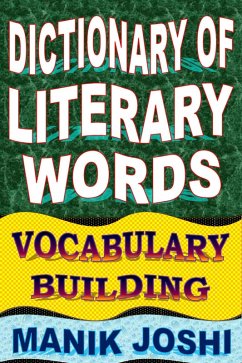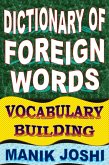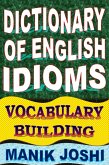'Literary words' are associated with literature.
'Literary words' are typical of a work of literature and imaginative writing.
'Literary words' are used with a particular meaning, in narrative, drama, poetry and other writing in a literary manner.
This book has been divided into three sections:
Section 01: Common Literary Words
Section 02: Figurative Use of the Words
Section 03: Glossary of Literary Terms
IMPORTANT NOTES
NOTE -- A:
ELEVATED WORDS
Use of an 'Elevated' Word in Place of a 'Simple' Word
'Elevated language' is widely used in literature.
Elevated Word -- a word that is used to show a high intellectual level
Simple Word -- a word that is used to keep the conversation simple in daily life
Example 1:
'Behold' [elevated word] 'See' [simple word]
Meaning of 'behold' and 'see':
to become aware of something by using your eyes
Example 2:
'Blithe' [elevated word] 'Happy' [simple word]
Meaning of 'blithe' and 'happy':
showing or feeling pleasure
******
NOTE -- B:
FIGURATIVE USE OF THE WORDS
Many words and phrases are used in a different (literary) way from their usual (literal) meanings to produce a special effect. [I have put these words together in Section-2 (figurative use of the words) of this book.]
Example-1:
ache: In a general sense -- to feel a continuous pain
His leg ached because of injury.
ache: In a literary sense -- to be very sad
His false accusations made our hearts ache. [= made us sad]
Example-2:
Flash: In a general sense -- to shine brightly for a few moments
The camera flashed once.
Flash: In a literary sense -- to suddenly show a strong emotion
Their eyes flashed with horror.
******
NOTE -- C:
'LITERARY TERMS'
There are many words that are used to describe a particular form of writing in a literary work or used in the analysis, discussion, classification, and criticism of a literary work. [I have defined these terms in Section-3 (glossary of literary terms) of this book.]
Examples:
catharsis -- the process of releasing strong feelings through artistic activities
diction -- the choice and use of words to create a specific effect in a literary work
epithet -- a word or expression used to attribute a special quality to somebody/something
genre -- a particular category, style or type to which a literary wok belongs
holograph -- a handwritten piece of writing by its author
idyll -- a poem that describes a peaceful and happy scene
juvenilia -- a literary work produced by an artist, in his/her youth
melodrama -- a literary work that is full of exciting and exaggerated events or emotions
opera -- a dramatic work where a majority of the words are sung to music
panegyric -- a speech or written composition that praises somebody/something
prosody -- the patterns of rhythms and sounds in poetry
quatrain -- a verse of a poem that has four lines
refrain -- a line or number of lines of a song or poem that is repeated after each verse
scene -- one of the small sections within an act (a major division) of a play
semantic -- relating to the meaning of words and sentences
trilogy -- a set of three books, plays, movies, etc. on the same characters or subject
figure of speech -- an expression in which a word or phrase represents one thing in terms of something dissimilar (non-literal) to create a particular effect in somebody's mind, or in which an emphasis is produced by patterns of sound. [Some common figures of speech are as follows -- alliteration, anaphora, antistrophe. apostrophe, assonance, consonance, hyperbole, irony, litotes, metaphor, metonymy, periphrasis, personification, simile, synecdoche]
Dieser Download kann aus rechtlichen Gründen nur mit Rechnungsadresse in A, B, CY, CZ, D, DK, EW, E, FIN, F, GR, H, IRL, I, LT, L, LR, M, NL, PL, P, R, S, SLO, SK ausgeliefert werden.









